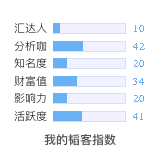2楼
trend , divergence, K parttern , sl 5pips tp 10pips = nice trade
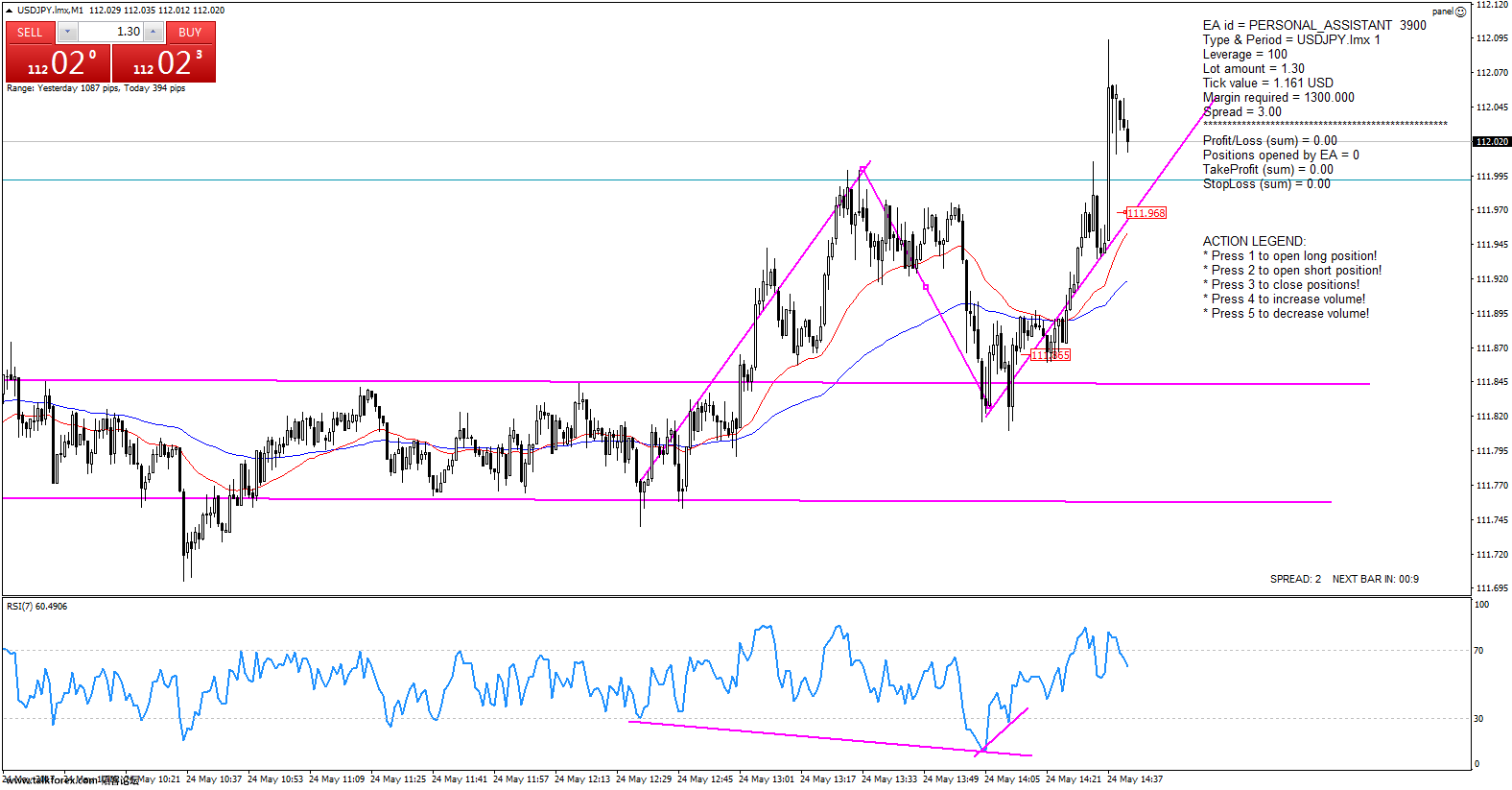 USDJPY.lmxM1.jpg
USDJPY.lmxM1.jpg
 USDJPY.lmxM1.jpg
USDJPY.lmxM1.jpg韬客社区www.talkfx.co
3楼
本帖最后由 谁的糖糖 于 2017-6-7 14:59 编辑 入场理由都在图上修改下,divergence应该是反divergence 1.EU +10pip 2.比较可惜的是UJ有点贪了,没考虑到逆大势,赚了没止盈,最后BE +2pip3.EJ +11pip flag突破scalpe一下,下面有支撑,快速出了 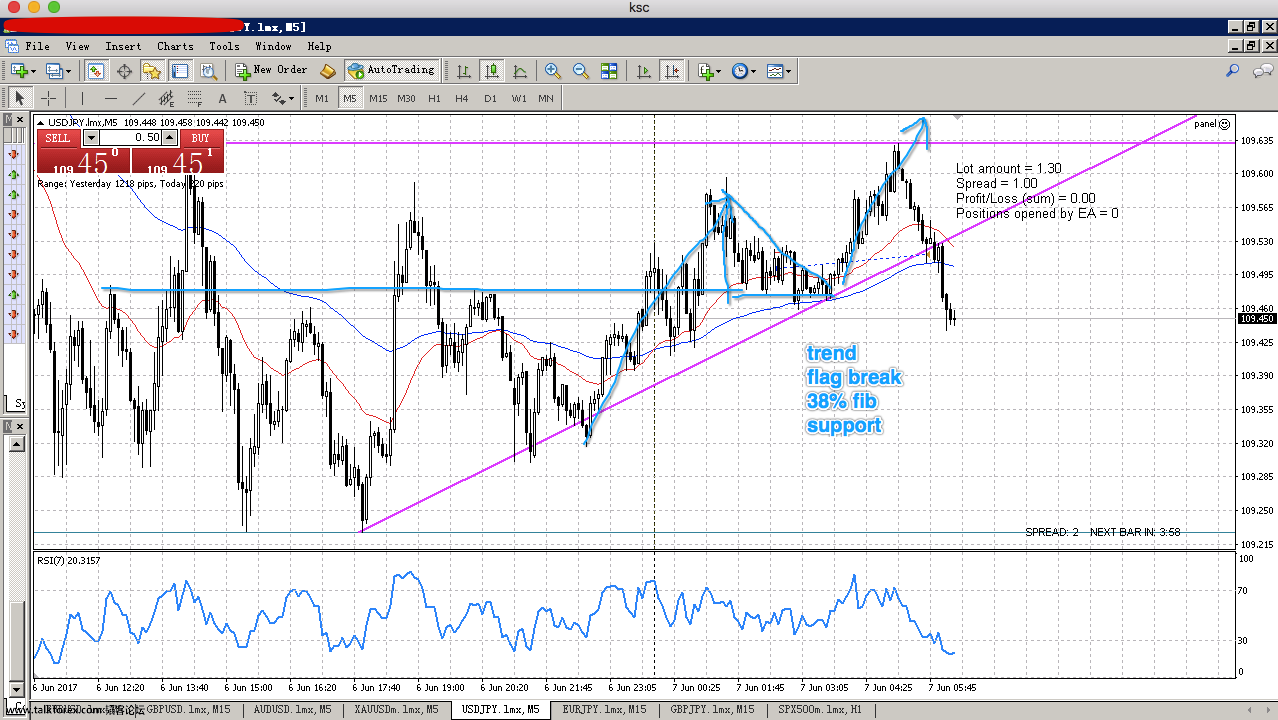
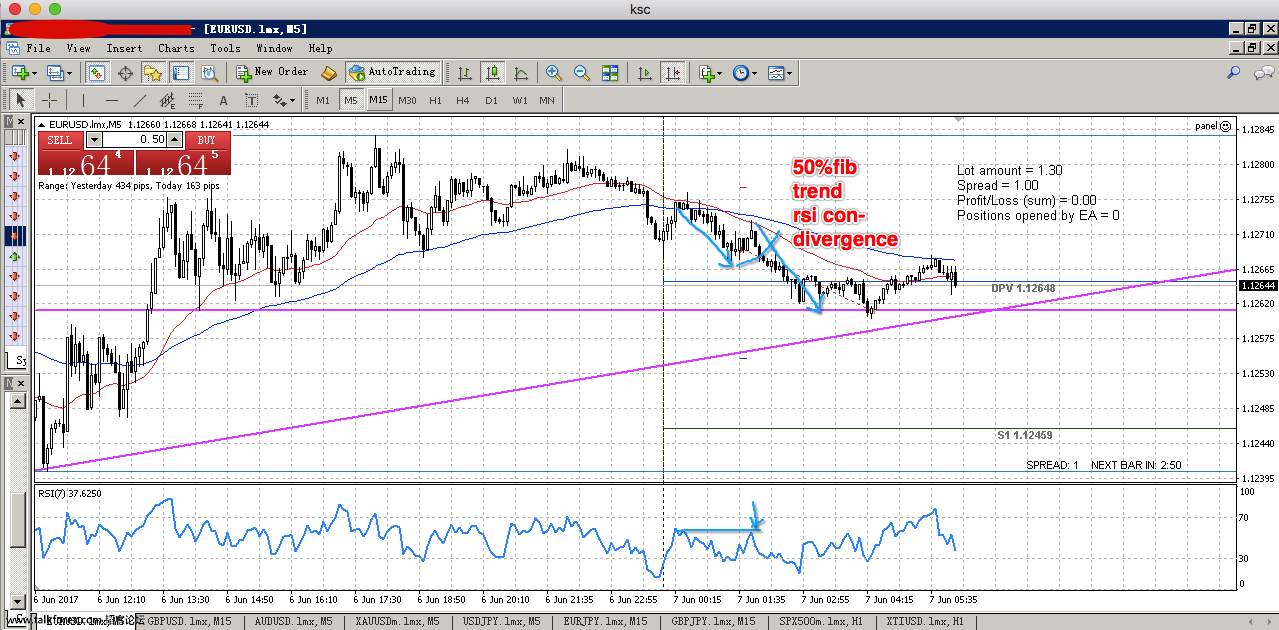
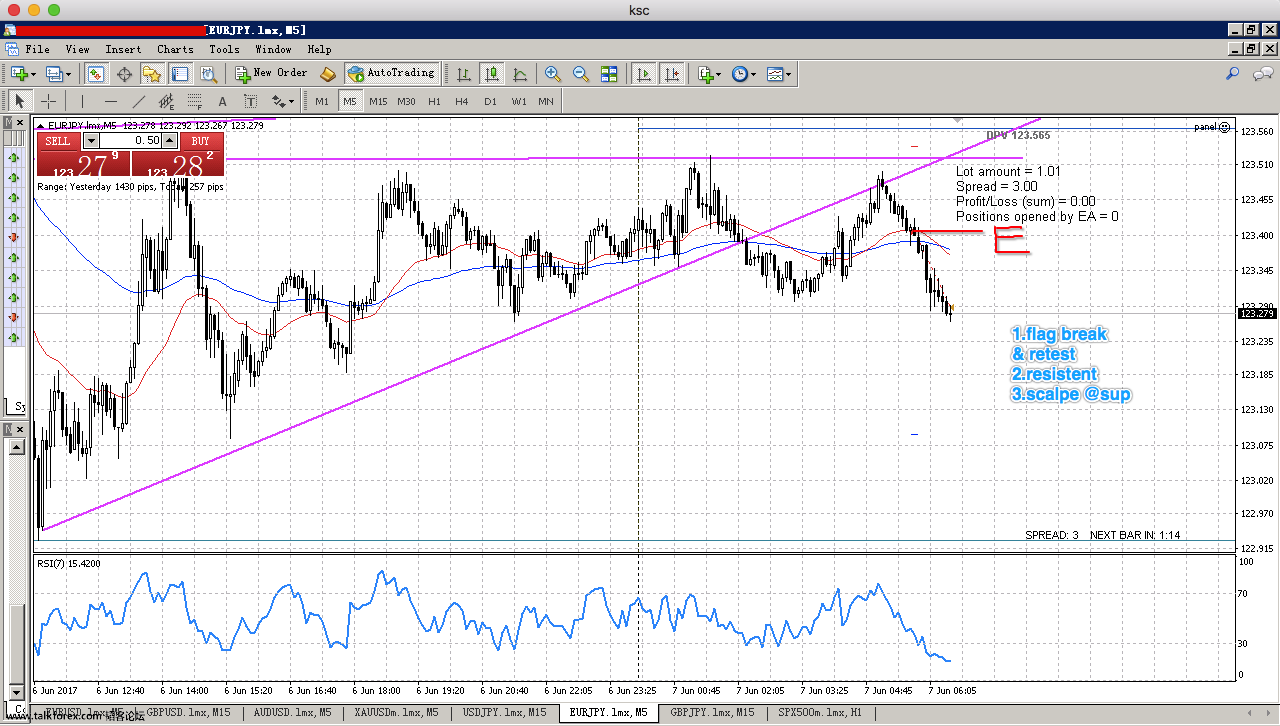



韬客社区www.talkfx.co
4楼
本帖最后由 谁的糖糖 于 2017-6-14 14:31 编辑
学习一下
2) Have a System That fits You: Every successful trader, investor,money manager,etc.. has a systemthat fits them. Some are long term, some mechanical, some intuitive,day traders, scalpers, arbitrage, value, momentum.The system its self isnot the important factor. What is? Is that the system fits their unique personality. The system does not matter. I've heard of value investors (WarrenBuffet) who make untold millions from the stock market. I've heardof day traders taking home over $2 million per annum in profits.I've heard of a dancer making $2,5 million from Momentum trading.What do they have in common? As you can see it's not the system butthey operate a style of trading that they are both happy with andexcel at. They wouldn't dream of trading any other way. No-one toldthem to trade this way it just happened this way. Too many traders try to copy the latest hot fad in trading. Rightnow that would be day trading. But that style of trading will not suiteevery-one. To be a successful day trader you have to love the short termup and downs of the market during the day. Being in contact with quotesfor hours at a time. Yes, there are a number of traders making very goodincomes from day trading, but there’s many more who lose their shirtswithin a couple of months and don't even find out whether day tradingis suited to their temperament. For some traders buying a stock and holding on to it for a year asit doubles in price would be torture. Although long term investing canoffer fantastic rewards with very little work unless you have thepatience and discipline to ride your profits all the way to the topthen you'll never succeed with this method. It's a little like choosing a career. I remember reading a book sometime ago about the world's best managers. And one characteristic the authoremphasized with all these top achievers was their LOVE for their chosencareers. Most of them said they couldn't believe they were getting paidto do something they loved so much. It's no different in trading.You will only be a top trader if you trade a system which you simplylove to trade. You wouldn't swap that way of trading for anything. Andthe profits you make, well that's just icing on the cake. How do you find a system you are happy with? You have to work backwards.First work out your objectives!Ask these questions:* What annual rate of return do I want?* Do I want to trade full time, part time, hardly any time?* Can I handle the stress of day trading and short term trading?* Do I have the patience for long term trading?* What kind of personality am I? Do I need lots of action, Do I need to make decisions all the time?* What trading books have i read and which top traders do I most admire and why? Could you easily copy their style of trading? What-ever you do don't read about a hot shot day trader and then try to emulatehim if day trading is not for you. Strive to find a way of trading you willbe comfortable with and aim to become the world's best at this style of trading. For me I like the thought of buying a share at $30 and selling it9 months later for $130. Sure it doesn't happen all the time. But itonly takes one or two of these moves per year to make it a fantastic return.I am very patient. Not only whilst in a trade but I see absolutelynothing wrong with sitting on the side-lines for months. If theconditions aren't right for me than I will not trade. I love the ideaof spending just a few minutes per day checking the charts and the restof the time is mine to study and write, etc.. For me the big money isin the big moves, not the individual fluctuations. This style of trading will not suite every-one, but the point isafter many years of trial and error I have found a system that fits meand I aim to become THE world's best trader with this system.You must do the same. If you are trading a system that does not fityour personality you can never gain the confidence nor the results totruly make the big profits. If you are a new trader or an unsuccessfulone then I suggest you start by asking your-self"What kind of trading suites my personality?" Spend lots of time gettingthis correct as this is you foundation. Build a strong foundation andyour trading system will be strong and stand the test of time.Build a weak foundation and your trading system will crumble alongwith your money. This is where the majority of traders go wrong. They have no idea whichstyle of trading suites them. They keep buying into the latest software,or listening to the new guru, hoping this will change their trading results.Most never get to know what successful trading is all about as the averagetrader lasts SIX months. I believe any trader who can last over TWO yearsin the market will probably go on to become one of those rare breeds:A Stock Market Winner. Why? Because after two years they start to developa set of rules that fits them. They start trading a way they are comfortablewith. Unfortunately, in their haste to make a ton of money, most traderswill never get two years experience before they lose their money and/ortheir interest. Say it today. " I will find a system that fits me and I will become THE world's besttrader at this ONE style of trading" Go and get to work. There's a lot of soul searching to be done.
3) Plan a Trade and Trade a Plan: Without doubt, no trader will last long if he doesn't plan every trade.But there is absolutely no point in making a plan for a trade if you are notdisciplined enough to follow it. A plan should cater for every eventuality. As Richard Dennis (Turtles fame)said,"Don't worry about where the prices are going. Worry about whatyou are going to do when they get there." Think about what is being said here. Once you put your money down on atrade you can not control the prices. So stop worrying about what couldhappen and concentrate on you trigger points and what you will do whenthese points are violated. By doing this your trading stops being emotionaland now becomes very systematic and stress free. Look at this example:1) you like the look of stock XYZ Corp. currently trading at $40 and youplace a buy 100, stop in at $42. This is just the beginning. You must thenask and answer the following questions:* IF filled on this trade where will where will I place my initial stoploss. i.e "How much of my capital am I willing to lose?"* IF filled on this trade how will I take profits? By how much will Itrail my stop? What exit strategies will I use?* IF filled, will i add more shares as the trade goes my way?* If filled and the share does not show a profit after X weeks, willI get out, or will I let my trailing stop exit me from the trade.* IF stopped out of this trade will i be willing to try and get back in,or completely scratch the trade and look else-where?2) So having made a complete plan, prior to entering the trade you placethe order to buy 100 XYZ corp at: $42.3) You are filled at $42 1/4, automatically you place a stop order in at$39. No guessing it's done automatically.4) The trade goes your way and a second buy order is placed in at $50.5) You buy 100 more at $50 and the stop is now moved up to $45.6) The trade goes your way and you keep raising your stop at a safedistance behind.7) Your sell stop is hit at $130 and you exit the trade with a massiveprofit. Do you see now that by having a plan everything becomes automatic.You know where to get in, place stops, add and exit. In short you arenow trading professionally and not from emotion. Not once did you have to ask for opinion. Not once were you afraidof letting a profit get away, or of a loss becoming too big.Simply put, if you make a plan and have the discipline to follow ittrading becomes very simple and stress free. In my many years of trading one point I try to get across to otherwould be traders is the market will always do its utmost to throwyou off track. Once in a share it's a little like riding a wild horse.The prices will thrash around violently shaking off all scared andemotional traders. It will only be the ones who have the disciplineto follow a set plan that will benefit from the full move. If you ever find your-self having to ask some-one for an opinionon a stock you hold then it can only be because you either have notmade a plan, or you are second guessing the plan, in which case you mayas well not bother making one in the first place. Planning a trade should be no different from planning a journey.You must plan for all kinds of events. Especially the unforeseen ones.Most of the time a trade will go your way and the plan will barelyhave to be looked at but what if the share gaps down? flys up? goessideways for six weeks, the market crashes, the company announces acomplete surprise announcement which makes the share gain $30 inone day? If you aren't prepared for these surprises then whenone does happen you are going to find yourself wandering what to do.And once your are trading from the "hip" and not from a plan thenexpect your results to worsen. Having a plan totally removes all opinion and emotion from atrade and anything which does this can only be good news.Time and time again at seminars and meetings I hear the samequestions: " I bought ABC stock at $25 a few months ago, do you think Ishould still keep it?" When I hear such questions I (discreetly) shake my head. Howcan any-one trade such a way? Where is his plan? When he got intothe trade where was he get out point? Basically what the hell isthis guy doing trading? Does he really expect to out-perform themarket when he has to ask a third party about his stock holdings? If this guy had a plan and more importantly the discipline tofollow he would never ask such a question. This is probably the single biggest reason people love tofollow opinion. People just love to be told to do somethingrather than thinking of it for them-selves. Reading a recentInternet magazine I was astounded by the number of followerssome of the tip sheets have. The top ones have from 15,000to 80,000. Are any of these followers really making them-selvesbetter traders? I have no doubt a small percentage are but themajority aren't. Why? Because by following some-one else theyabondon the principles laid down in this book. There is nosystem. Responsibility has no been shfted to the guru (so there'sthe excuse for the losses in place) Worse of all they do nothave a solid plan. When you start following your own plans you will find yourselfnot wanting to listen to out-side opinion. If you hold ADFstock and bought at $60 and your initial stop loss is at $56 thenwhy would you care if the local guru is saying, "Sell ADF it'sover-valued and will fall to $20." For one, he is just as likelyto be wrong as right and secondly if your stop is at $56 then letthis kick you out of the trade. At least that way when you askyour-self "did I follow my rules today?" the answer will be YES. I can guarantee before Warren Buffet, or George Soros buys$50,000,000 worth of stocks they know exactly what they will doif prices swing one way or another. Could you imagine Warren Buffetthinking, " gee, I bought $20,000,000 worth of DFG stock and it's down by 15%. what shall I do?" No way! And why should it be anydifferent for your trading? The point is it doesn't matter whetheryou are trading with a $5,000 account or a $50,000,000 theprinciples are the same. You must eliminate all emotion and followYOUR plan. To be a winner in the markets you can never trade from emotion.and the only way to eliminate emotion is to have the irondiscipline to follow your own plan. It's said most traders neverplan a trade never mind have the discipline to follow one.If you want to become one of the few market winners you must"Plan every trade and trade every plan"
5楼
4. Work Hard at Learning How to Trade Properly and Keep Working:
This is no different from any other trade. Would you expect to
become a brain surgeon after attending a week-end seminar and reading
a few books? Yet, why do so many people expect to become a Market
Wizard within such a short period of time?
If you ever have the privilege to ask questions to a successful
trader you'll realize just how much effort, time, determination and
lost money it took until they arrived at where they are. Being a
consistent stock market winner is no different from being a top lawyer,
Doctor or businessman.
First you must decide that you really do want to trade. Ask your-self
is trading the stock market something I am genuinely interested in or
are you lured by the potential money it has to offer you? I always
remember reading a book called " Grow Rich With Peace of Mind"
Napolean Hill. Whilst interviewing the top people in a number of
professions he came to the conclusion that these people loved their
chosen fields. They would have done it for no money. Trading is the
same. If your number one goal in trading the markets is simply to make
as much money as possible then I doubt you'll make it into the super
trader status. If you are simply chasing the money it can be a
motivation as long as you are motivated to learn and work at what
really works in the market and NOT keep chasing the latest hot new
trading idea that exploits peoples love of money to make them act.
I am amazed at the number of traders who have not even read a
number of very basic stock market books. It seems it is too much
effort for them to read a book and learn some basic principles.
Yet, these people will blow a $10,000 account in less than 6
months chasing the pipe dream. Get real! Successful trading requires
not only a lot of ground work but on-going effort in order to keep
at the very top of your game.
In market wizards' I and II you will find that ,all but one trader,
went through years of trial and error, not to mention huge amounts
of effort until they became consistent, successful traders. Why
should it be any different for us? Are we saying we are better than
they are? Make no mistake, just like it takes many years of intense
studying to become a top lawyer, to become a top trader is no different.
If you are new then don't expect to strike out and make 80%+ returns
from the day you start. If you do then give me a call and I'll see
what you have that no-one else has. Consider the first three years
of your trading as going to University. The stock market is the
teacher and your initial account are your fees ( so keep it small)
So, what does it mean to work hard at your trading? I have broken
it down into two sections:
Firstly you will have to spend much time on analyzing your-self,
your personality, find a trading style you are most comfortable
with, learn how to trade properly, read, study, ask questions.
Basically, you are going to have to start from scratch and build
a system that fits you. It will take a couple of years at a minimum.
If this sounds like too much effort GOOD. You have just saved
your-self a lot of lost money. Forget trading and move on to
something which genuinely interests you.
If doing the above ground works sounds good, and you can't wait
to get started then may-be there is hope.
Once you have developed a trading system that fits you and you
have the iron clad discipline to follow your plan then it is a
constant battle to stay on top of your trading. As a trader you will
never get there, you are always getting there. You must strive to keep
improving. Never be satisfied with your trading system. Whilst I
don't say "keep looking for fault," I do say every system and trader can
be improved. The markets change their character over time, so keep
working on what impacts new developments have on them. Strive to
become even more disciplined and keep working on your mistakes.
Yes, even veteran traders still make silly mistakes. Look at
Jesse Livermore ( and I suggest you not only read this book, but
study and fear the way this guy operated). Livermore was a stock and
commodity trader way back in the early 1900's. He ran a small shoestring
account into several millions but kept losing it. On the one
hand he was one of the greatest traders to have ever lived, yet on
the hand he was dangerous in that he could not control his emotions.
Having run an account up to millions and then losing it, one would
think this experience was painful enough so as not to be repeated?
Yet when he painfully started from scratch, built his account into
several million again, only to lose it in one bad trade, then the
alarm bells should have been ringing. Any-one can make a mistake
but to not learn from it is fatal. Sadly, after repeating this event
one more time he could not face the thought of making a come-back
again and took his own life.
So whilst Livermore was a top, top trader he never worked enough
on his own psychology. Had he worked on a sound money management
plan and strictly followed a plan for every trade he would not have
created this situation.
The lesson? Even when you have made it to become a successful trader
that one fatal mistake is lurking in the dark waiting to hit you.
Only by keeping on top of your emotions and working on your trading will
you avoid running into a catastrophe.
How long does it take to become a competent trader? There is no set
time but i would say as a general rule here are some guide-lines:
(0-1 yrs)
* Work on finding out whether you are willing to put the time
and effort into finding a system that not only works but fits your
personality.
* Read some basic books on the stock market. Don't just read them
and think "hmm that’s interesting, nest one.." Really try to get
inside the traders mind. Get a feel for how much time and effort
was put in before they became successful, how many times did they
go down closed avenues? What characteristic made them such a good trader?
* Attend a couple of seminars. But not -ones where the "Secrets of
the Stock Market are Revealed" The secret is there are no secrets.
Give them a wide berth. Go to seminars about basic chart reading skills,
psychology of trading, money management, etc.. and if the lecturer knows
his stuff then get his contact information and keep asking as much
information as possible.
* Using a very simple charting package, start looking at some bar charts
of shares and the markets. Do nothing but observe
* Buy a self help book. Could be a motivational book or similar work
and work through it. My trading and life has become so much better since
I started working on my-self. It will definitely help in finding a system
that fits you.
At the end of year 1 you should know whether trading is for you. And a
certain kind of trading technique should appeal to you more than others.
Go with this natural feel, it is the one that fits you personality.
If you find trading is not for you? Great! You have saved a lot of
time and money. Move on. It's not for every-one. I personally know of
some traders who will have to go back to the start if they wish to
succeed. In the meantime they keep handing money to the market.
It's sad because they've been trading for years. When will the penny
drop?
YEAR 2:
* Open an account with a small amount of cash. This is your learning
fees. Expect to lose it all as part of your fees.
* Keep reading, studying, attending seminars and asking successful
traders.
* Develop a style of trading you are comfortable with. Back test it
by hand and get a feel for the size, regularity and number of trades
your system gives out. Try to determine how many streaks it comes out
worth. ie did it have 5 successive losing trades? Did it have 7
successive winning trades? That way in the heat of battle and your system
has just given you 5 successive losers you know there is nothing wrong.
Get a feel for how it reacts in certain market cycles. Every system acts
better in certain market conditions than in others.
* Develop a plan. (re-read section 2) Try to accommodate for every
possibility.
* Keep observing the charts. I am not a great believer in paper trading
in order to find how much progress you have made in trading. Simply
because you have no emotions whilst playing games and it is controlling
emotions that separates the winners from the losers.
But what I am a great believer in is playing simulation games so as
to get a feel for how money management plays such an important role and
for you to get a feel for how any game of chance can and will have streaks.
This is what i do from time to time.
Get a hat or jar and place 100 marbles inside. I paint the winners blue
and the losers red. I paint a HR (home run >10 * Risk gain) on just four of
those marbles and I paint a BL ( big loss >4 * risk) on four of them. All
the rest are either 4 * Risk gains or 1 * risk losses. Here's the
interesting part. Start risking different dollar amounts on each trade
and see the difference in your results after 100 trades. This should
really hammer home the importance of money management.
Firstly, say you start with a $10,000 account risk just 2,5% on each
trade. Therefore, risk per one trade is $250 or R = $250. If you draw a
losing marble your account is debited $250. If you draw a winning marble
your account is credited by 4 * $250 = $1,000. If you hit a "Home Run"
then your account is credited by 10 * R = $2,500. On the other hand if
you hit a "big loss" trade then you are debited by $1,000.
Put the effort in and give this a try. You'll be amazed at the difference
position sizing can have on your account after 100 trades. You'll see even
in a 50/50 you run into streaks of winners and losers. Having 5 successive
winners and losers is quite common. Not only that try to imagine your-self
trading this system. How are you going to be feeling after taking 5
successive losses? Will you be feeling something is wrong. What happens if you
risk $500 per trade and you start off with a "big loser"? That's a $2,000
loss. Can you come back from this? Be pro-active and play around with the
figures it's a great simulation.
* If you feel comfortable trading make a trade.
The whole point of trading is to follow your rules. Making or losing
money is not the important point. Trade with such a small amount it
hardly seems worthwhile. What you want to know here is:
How do I react when my money is down?
Can I follow my rules?
Is my system working in the long run?
Year 3
You should have your own system that fits you and starting to take
small gains out of the market. If you still find your-self lacking the
discipline to follow the signals ask why? Keep playing the simulation
game as though it was your system and see why taking four or five
successive losing trades is acceptable as long as you can manage the risk.
Year 4
By now, if you are still trading, you should be pulling consistent profits
from the market and know your-self well enough to continue learning.
Consider learning to trade like taking a degree in the stock market.
Are you willing to sacrifice 4 years in order to learn the trade? If not, then
walk away now. If you are then get to it.
If you want to be a top trader there's a lot of work involved.
Don't be fooled by all the trade magazines saying you can pull 100%
out of the markets year in and year out with no effort. It isn't going
to happen. But if you really do keep working at it the rewards can be
amazing.
补充内容 (2017-6-25 16:25):
韬客社区www.talkfx.co
7楼
空UJ的一单,入场点犹豫了一下,就没再追。从系统上看是个经典的ABCD入场点位divergence+头肩顶的颈线位阻力+不错的盈亏比 止损3p,止盈+10p左右 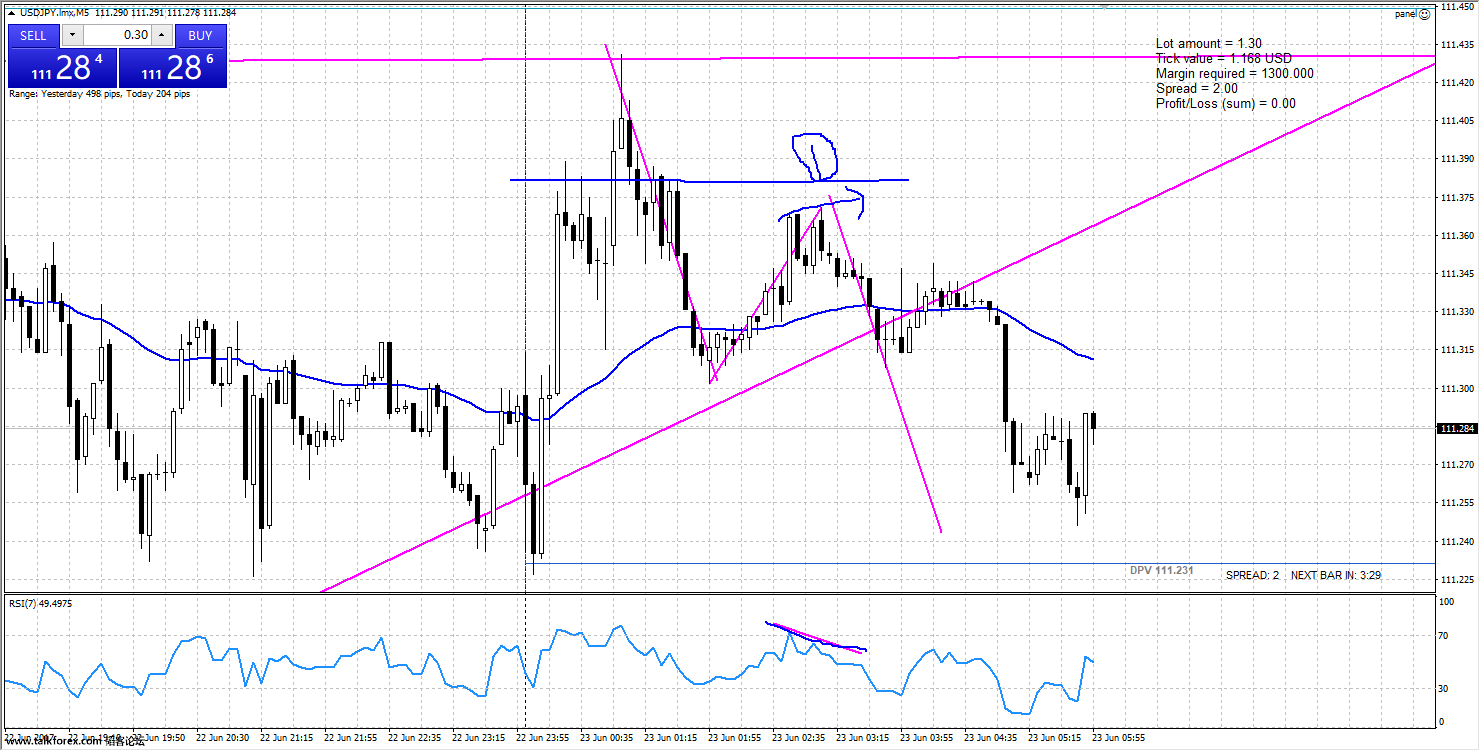

韬客社区www.talkfx.co
8楼
做多澳元的一单,盈亏比是:+11P/-6P,事后看来,盈利会更多,但是短线不能贪,1.5:1以上的盈亏比就可以做。如果想做1H的TF,可以再做大,做短线最忌讳的就是看5M入场,赚了10几个P,就去1H图上找点,想着跨大周期赚更多。这就犯了一个错误,不是说交易中不能贪,而是这个大周期并不是你的交易计划,不是你入场的原因。所以,往往会导致,出现变动,你没有做好相应的plan。 其实这单不是很值得一说,就是15M级别的下降三角突破,一般这种三角形都是强烈的看跌信号,但是这单是向上突破。基本面是,美元涨了一周,周五的一个回调,所以看起来是弱势之后的反弹突破。 其实想说的是,这种“抄底”操作,上周吃了不少亏,作为强势美元带来的一波非美弱势单边中,不但没有赚到钱,反而亏了不少。原因就是急于抄底,抄底不是错误的,但是操之过急,没有相应的“抄底系统”,就是失败的。做逆势经常会找反转的parttern,W底M头,或者指标背离等等。而一个完整的抄底系统,应该是可以互相确认的,要加上上升趋势线的向下突破,虽然这样会少吃一部分利润,但是准确率会很多,也会让你管住手,减少逆势抄底摸顶的低胜率行为。 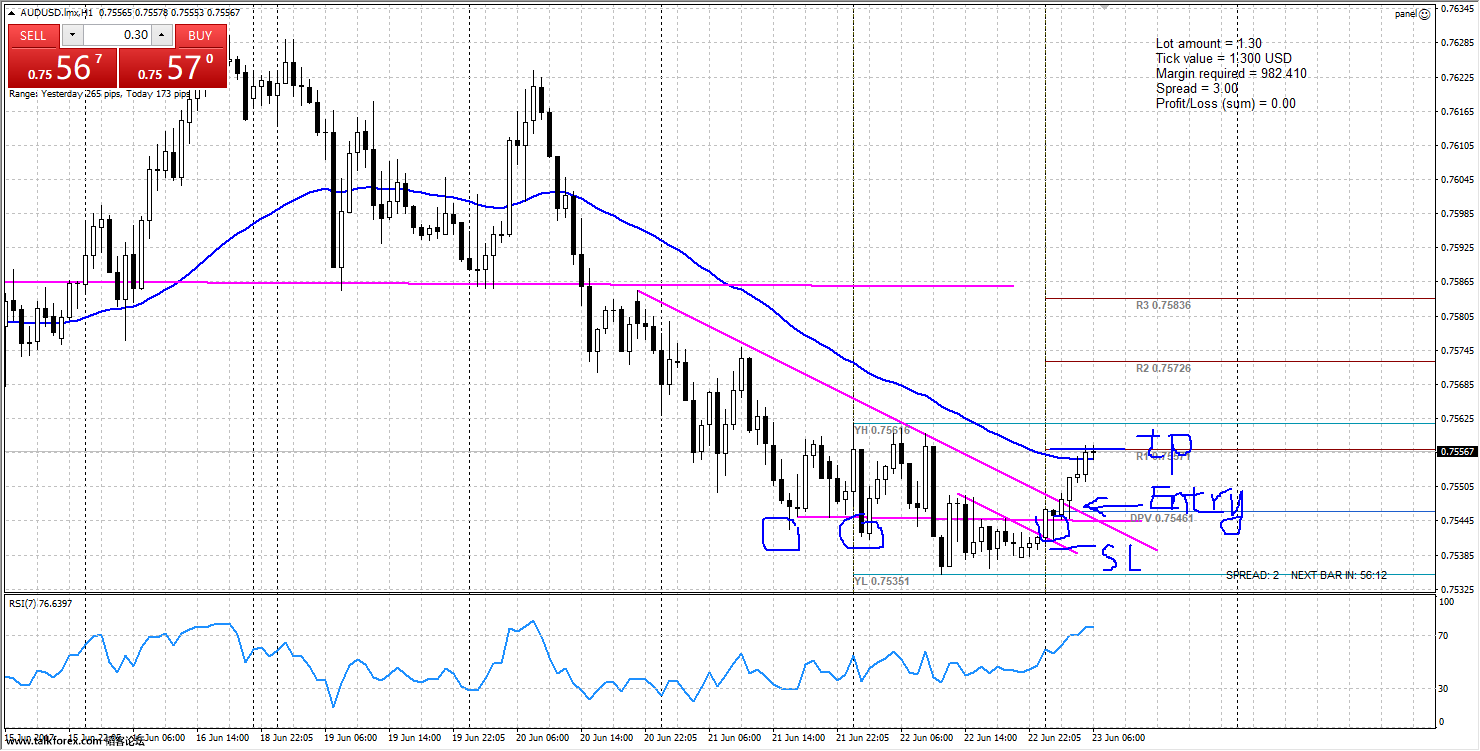

韬客社区www.talkfx.co
9楼
复盘复盘复盘复盘复盘复盘复盘复盘,区分一下 本周某天的XAU图 想要说明的是入门交易时,要将注意力集中在关键位置上,比如支撑,阻力,趋势线,自己设定的MA曲线,RSI指标等等。 然后,在这些位置上,注意支撑阻力的相互转换,K线形态,和趋势的转换。以此为根据,制定交易计划,然后,静静等待入场。 通常作为新手,关键点位所出现的pattern还是更又效果,准确率更高。成交量更高的品种,顶底转换,pattern,R/S转换,更是标准,如果这张图上标记的点位,都非常准确,趋势的延续,反转,突破后必回踩。三角,旗形,整理后的突破,都是很标准的 OK,先知后行,如果知道了,下一步就是不断的练习,看执行力了! 补充内容 (2017-7-11 15:42): 很多人总结,行情只有2种情况,单边,震荡。其实从另一种角度(level)来看,可以说行情分为这两种情况,惯性(轨道),离心力改变(脱离原始轨道)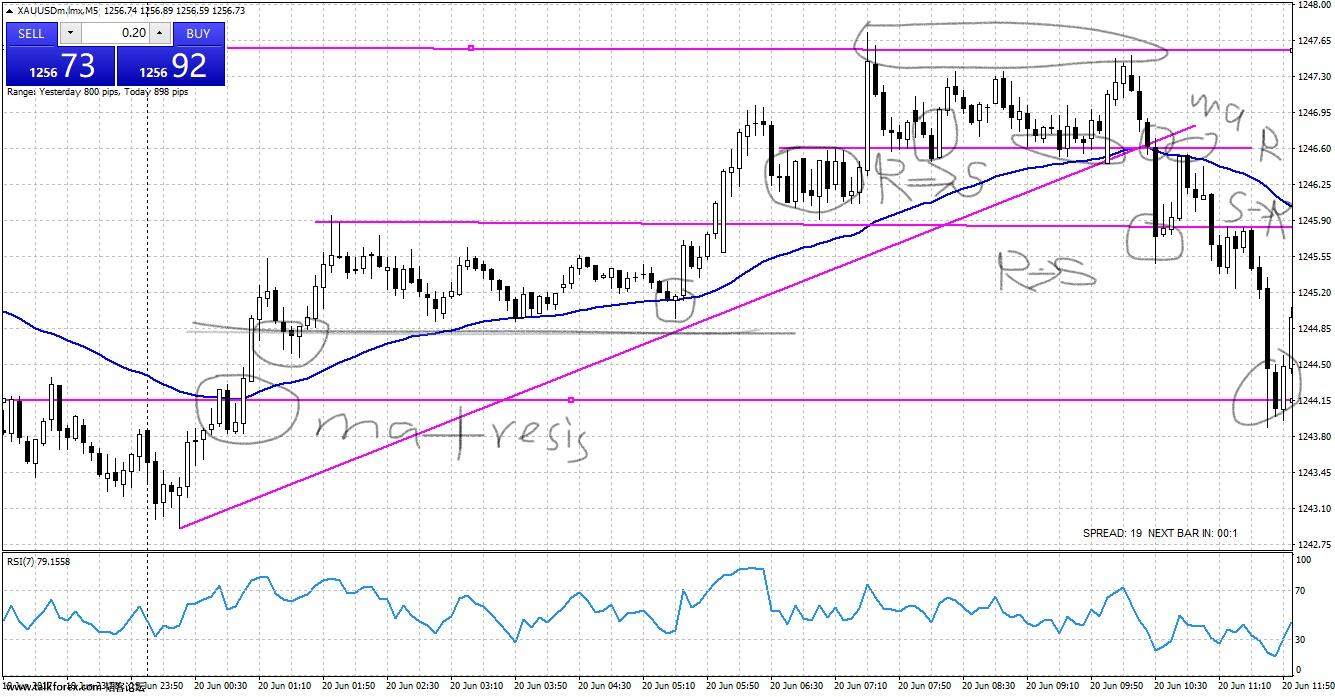

10楼
发一个自己经常犯的错。入场点如图所示,入场时心理状态如下:A下降趋势,B 三角形下降旗形收敛,C 几次触及DPV反弹,说明DPV支撑有效 D 结论:多空皆有理由 然而没有等三角形突破,也没有按照趋势下单,很随意的认为会在DPV继续反弹,进而上涨,所以,随便点了多单。 下单之后才考虑到如何止损(止损很难设),逻辑止损前低有2美元,有些大,RR比很低 正确的做法是,等待三角突破,走出方向后下单,或者根据趋势下空单,止损很容易,设在三角形上端。RR至少在2:1,即使止损,亏损也小于现在。 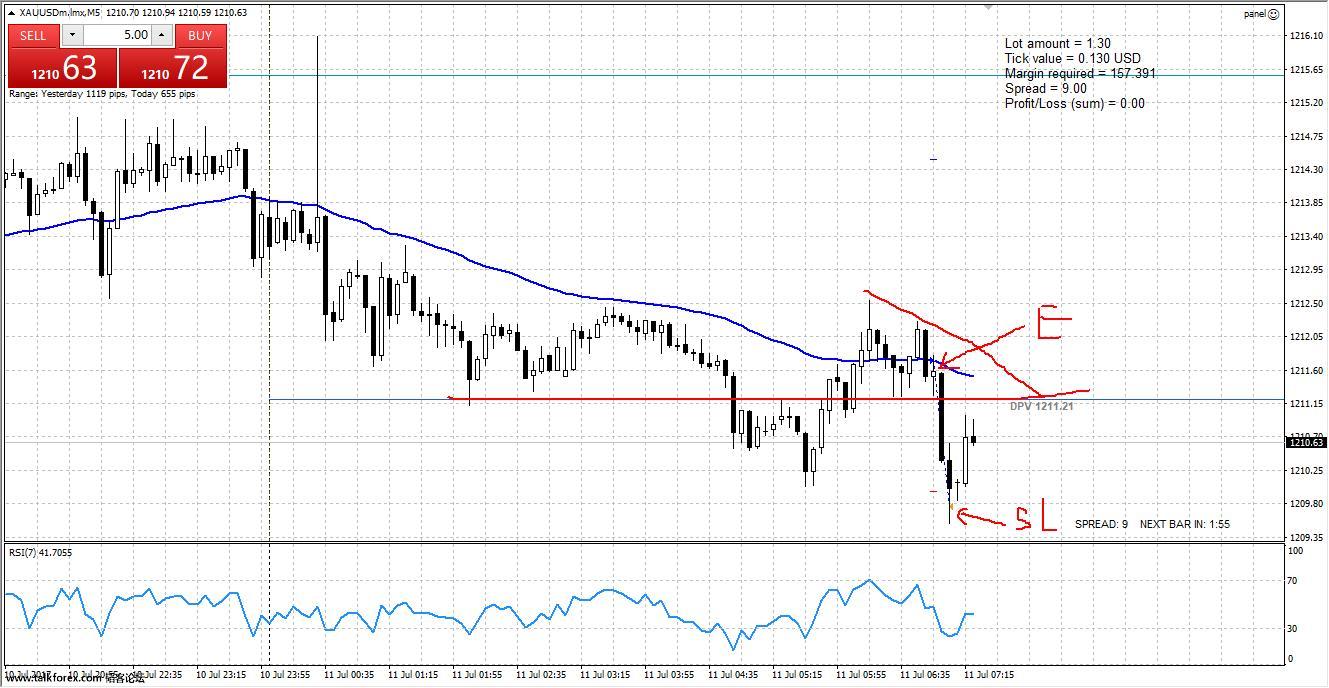

韬客社区www.talkfx.co






